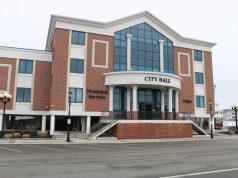
By MADDY VITALE
Sea Isle City unveiled a 2021 municipal budget that calls for a half-cent increase in taxes, a large surplus for emergencies and capital projects.
Despite a difficult 2020 amid the COVID-19 pandemic, which resulted in cancellations of a host of events that traditionally bring a lot of money into the city, officials laid out in a virtual meeting Thursday what they called a conservative spending plan that offers all that the city needs without a major increase to the taxpayers
“Like I always say, a budget is a plan. Obviously, we had a challenging year before us,” said Paula Doll, the city’s chief financial officer. “Hopefully, moving forward, things will be better. It’s a plan. We don’t know what will happen.”
The municipal budget comes in at $26.8 million, up from $25 million in 2020. The proposed plan includes a nearly $7 million surplus.
Mayor Leonard Desiderio said Tuesday in his State of the City address that the nearly $7 million surplus, which is an all-time high, reflects Sea Isle’s strong finances overall.
The half-cent tax increase equates to a $34 increase for the year for an average home assessed at $683,500.
City Council members commended Doll, City Business Administrator George Savastano and Leon Costello, the city’s accountant, for creating a budget that is prudent.
“It just seems that Paula, George and Leon got together, looked in the crystal ball and found that formula for us,” Council President William Kehner said of how well the city’s finances and budget are managed.
For 2020 and 2019, the city’s municipal budget did not have tax increases.
Doll explained that despite COVID, the city had a strong year.
“Our property tax collections pushed us over the top. It was incredibly good in 2020. It was 99 percent,” Doll said.

Kehner commented on how remarkable it was that the tax collection rate was so good despite the pandemic.
“It’s amazing. It’s the one word I could think of,” he said in an interview. “We just seem very fortunate that our taxes are being paid. In other towns, a lot of homes were in foreclosure.”
Councilman Jack Gibson called the spending plan a “good budget,” but said that he had some concerns because he felt that there was not enough money set aside for the city’s marina and for shared-services agreements.
“It is very popular,” he said of the marina.
Gibson said of shared-services funding in the budget: “I think we are too conservative there.”
He believes there should be an increase in the budget funding for the marina and shared-services agreements.
Councilwoman Mary Tighe asked the administration to consider using more surplus so that there isn’t a tax increase, especially when families have been hit with the loss of jobs and struggle amid the pandemic.
“People don’t necessarily have a lot of cash at hand and anything we can do to not have a tax increase will benefit our people,” Tighe said. “I looked at a lot of things and we have a lot of areas with quite a bit of cushion.”
Savastano explained that the budget plan in place does have ample surplus. However, he said that certain projects, including the city’s proposed community recreation center, have to have funds set aside so that there is enough money for them.
“What we are trying to do in this budget is to plan the best we can and be conservative so we don’t leave ourselves short with the capital plan down payment and we also don’t want to burden the taxpayers,” Savastano said.
He continued, “Part of the strategy Paula had is we were fairly aggressive with using the surplus in order to keep the tax rate as low as we felt was prudent. We have worked very hard over the last 10 to 12 years to bring the surplus to a good position.”
During the public portion of the meeting, former City Councilman John Divney urged the administration to bring a zero tax increase budget to the table for a third year in a row.
“I think we can do everything we can to avoid the $240,000,” Divney said of the amount of money that the half-cent tax increase equates to. “We are giving this money to the taxpayers for ever and ever. We can go through the different nitty-gritty of it. There is $240,000 in there, I am sure.”







